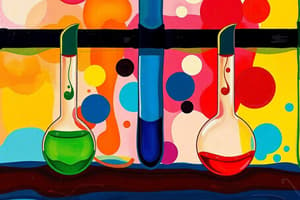Podcast
Questions and Answers
What is the main principle that allows distillation to separate components in a mixture?
What is the main principle that allows distillation to separate components in a mixture?
Distillation separates components based on their different volatilities, where more volatile substances vaporize more readily.
In batch distillation, what characterizes the method of operation?
In batch distillation, what characterizes the method of operation?
Batch distillation involves processing a specific amount of mixture in a single run, with each batch being distilled separately.
How does continuous distillation differ from batch distillation?
How does continuous distillation differ from batch distillation?
Continuous distillation allows for a constant feed of mixture, providing uninterrupted separation over time.
What role does temperature play in the distillation process?
What role does temperature play in the distillation process?
What equipment is primarily used in the distillation process?
What equipment is primarily used in the distillation process?
What happens during the evaporation stage of distillation?
What happens during the evaporation stage of distillation?
In fractional distillation, why is it necessary to condense and re-evaporate vapors?
In fractional distillation, why is it necessary to condense and re-evaporate vapors?
What are some major applications of distillation in the food industry?
What are some major applications of distillation in the food industry?
What is the primary purpose of the pot still in batch distillation?
What is the primary purpose of the pot still in batch distillation?
How does the composition of the liquid remaining in the still change during batch distillation?
How does the composition of the liquid remaining in the still change during batch distillation?
What distinguishes batch distillation from continuous distillation in terms of operation?
What distinguishes batch distillation from continuous distillation in terms of operation?
What role does the reflux play in continuous distillation?
What role does the reflux play in continuous distillation?
Why is copper preferred in the construction of distillation equipment?
Why is copper preferred in the construction of distillation equipment?
What is the function of the reboiler in continuous distillation?
What is the function of the reboiler in continuous distillation?
What is meant by the term 'feed' in the context of distillation?
What is meant by the term 'feed' in the context of distillation?
How does the design of batch distillation equipment impact the quality of whiskey produced?
How does the design of batch distillation equipment impact the quality of whiskey produced?
What is the primary purpose of distillation in a chemical process?
What is the primary purpose of distillation in a chemical process?
How does fractional distillation differ from simple distillation?
How does fractional distillation differ from simple distillation?
What role does a fractionating column play in the distillation process?
What role does a fractionating column play in the distillation process?
What is 'Simple Distillation' and when is it typically used?
What is 'Simple Distillation' and when is it typically used?
What factors influence the efficiency of the distillation process?
What factors influence the efficiency of the distillation process?
In continuous distillation, how is the process maintained over time?
In continuous distillation, how is the process maintained over time?
What happens to the vapor after it leaves the heating vessel in the distillation process?
What happens to the vapor after it leaves the heating vessel in the distillation process?
Explain the term 'distillate' in the context of the distillation process.
Explain the term 'distillate' in the context of the distillation process.
Flashcards are hidden until you start studying
Study Notes
Distillation
- Distillation is a separation technique that leverages the difference in vapor pressures of components in a mixture.
- This difference in vapor pressures leads to the enrichment of the more volatile component in the vapor phase.
- In fractional distillation, the vapor is repeatedly condensed and re-evaporated, enhancing the separation.
Batch Distillation
- In batch distillation, a fixed volume of liquid is heated to boiling, and the vapor is collected separately.
- The composition of the liquid in the still and the collected vapor changes with time.
- Batch distillation is often used in the production of whiskey.
Continuous Distillation
- Continuous distillation involves a continuous flow of feed, with the more volatile component being enriched at the top of the distillation column.
- The condensed vapor is partially recycled to the column as reflux, enhancing separation.
- The source of heating is often steam.
Equipment
- Batch distillation typically uses pot stills, which have a single condensation stage.
- Pot stills are often made of copper and used in the production of high-quality whiskey.
- Continuous distillation utilizes columns with multiple stages, leading to a higher degree of purification of the more volatile component.
Basic Principles
- The temperature at which a liquid boils is its boiling point. Each liquid has a unique boiling point.
- When a liquid boils, it forms vapor at the surface.
- Distillation and refluxing rely on the principles of evaporation and condensation.
Considerations
- A single distillation may not result in perfectly pure components, some mixing will always occur.
- Fractional distillation is used to achieve the purest possible fractions.
- A larger fractionating column leads to a more efficient separation process.
Simple Distillation
- Simple distillation is used to remove a single liquid from a vessel, often a solvent.
- The vapor is condensed and collected separately.
Studying That Suits You
Use AI to generate personalized quizzes and flashcards to suit your learning preferences.




